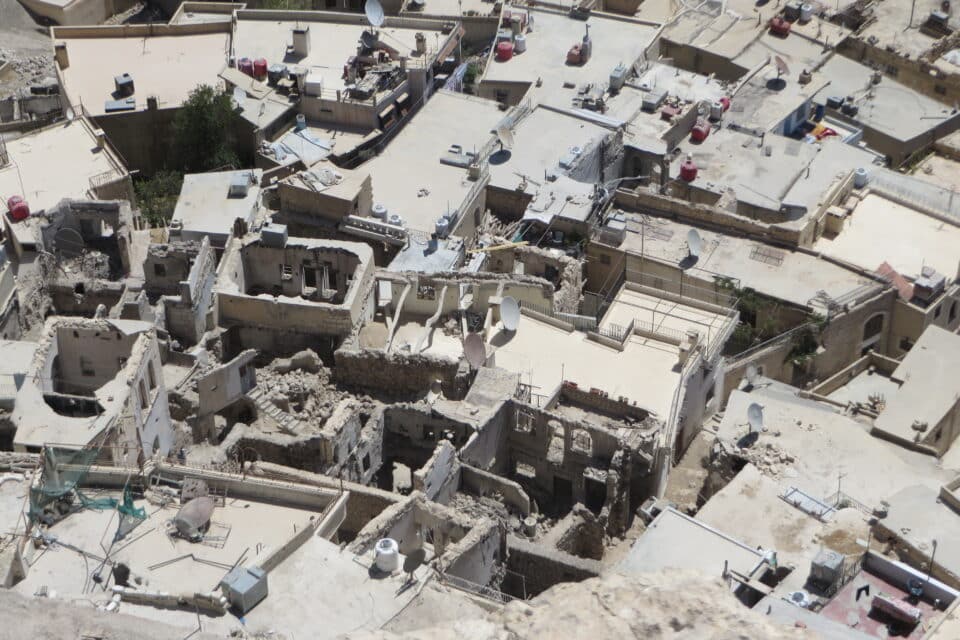Help our local partners realise their vision of hope for their communities

Sanctions on Syria were first introduced in 2011. They are, according to experts, among the “most complicated and far-reaching sanctions regimes ever imposed”. They include many layers of bureaucracy and a labyrinth of legal injunctions – even more complex and more severe than those previously applied to Sudan.
Sanctions on Syria are some of the most complicated and far-reaching sanctions regimes ever imposed.
1. WHO IS RESPONSIBLE FOR SANCTIONS ON SYRIA?
The U.S., Canada, Japan, Australia, UK, Switzerland, Norway, Turkey, the 27-nation European Union and the 22-nation Arab League support a complex network of sanctions on Syria.
2. WHICH SANCTIONS ARE IMPOSED ON SYRIA?
Sanctions limit trade in ‘dual-use’ products that can have both civilian and military applications. For example: pipes, water pumps and essential construction equipment; nitrous oxide (used for anaesthetics in hospitals); agricultural fertiliser and pesticides; certain drilling tools; chlorine products used for water purification and sanitation; computers and IT equipment; and power generators.
Sanctions include a de facto prohibition on transactions denominated in U.S. dollars. This acts as a dampener on many aspects of the Syrian economy and forces much trade to proceed via the black market or through expensive intermediaries in Lebanon, Turkey or elsewhere. U.S. sanctions on Syria also prohibit the export to Syria of any product with more than 10 per cent U.S. content. This includes a huge number of medicines and medical equipment.
Sanctions on Syria became even harsher in 2020, when the U.S. implemented the ‘Caesar Act,’ which permits the sanctioning of any person, anywhere, even individual employees of foreign companies, who may be working to rebuild Syria after 12 years of war.
Complicated legal injunctions have, according to UN sanctions expert Idriss Jazairy, “created so much doubt and uncertainty on how to comply with all possible measures that banks, exporters, transportation companies and insurance companies have voluntarily refused to conduct business in Syria… international private companies are unwilling to jump the hurdles necessary to ensure they can transact with Syria without being accused of inadvertently violating the restrictive measures.”
3. WHAT IS THE PURPOSE OF ECONOMIC SANCTIONS ON SYRIA?
Officially, the aim of sanctions is to compel the Syrian regime to change its behaviour. However, sanctions have not removed President Assad, nor have they resulted in any meaningful political concessions by his administration. Contrary to their stated intentions, sanctions contribute to a worsening of the humanitarian crisis. They are among the biggest causes of suffering for the Syrian people.
4. ARE ECONOMIC SANCTIONS ON SYRIA SUPPORTED BY THE UNITED NATIONS?
The UN Security Council has not authorised any sanctions against Syria. In August 2020, as the COVID-19 pandemic raged around the world, a group of UN experts warned that sanctions are “bringing suffering and death” in Syria. They argued that the sanctions “should be lifted – or at a minimum eased – so people can get basics like soap and disinfectants to stay healthy, and so that hospitals can get ventilators and other equipment to keep people alive… Sanctions that were imposed in the name of delivering human rights are in fact killing people and depriving them of fundamental rights, including the rights to health, to food and to life itself.” In December 2020, the UN’s Special Rapporteur for Unilateral Coercive Measures again urged the U.S. to lift the economic sanctions on Syria.
5. DO ECONOMIC SANCTIONS ON SYRIA INCLUDE ‘HUMANITARIAN EXEMPTIONS’?
In theory, the sanctions on Syria include exemptions to protect civilians from negative humanitarian repercussions. In practice, they impede access to fuel, food and medicine for millions of Syrians.
When applying for licences to conduct their operations, civil society groups and aid workers are faced with many layers of bureaucracy. The process is so complicated, and the penalties for inadvertently violating the sanctions are so severe, that many NGOs, banks, and companies are reluctant even to try. As a result, according to one UN report, importing essential medical supplies into Syria has become “immensely difficult, nearly impossible.”
Even if these humanitarian exemptions were robust and easily obtained, the sanctions would still have a devastating humanitarian impact. Sanctions make it difficult to repair and maintain roads, trucks, power plants and hospitals. They make it harder to keep electricity running in hospitals and water plants, to keep vaccines cold, or to buy petrol for the trucks that distribute food. They make food and medicines much more expensive to buy for everyone. In those conditions, it matters little whether it is technically permitted to bring food and medicine into Syria.
In 2018, UN sanctions expert Idriss Jazairy concluded: “Despite the efforts to implement ‘smart’ sanctions with humanitarian exemptions, the application of current sanction regimes have contributed to the suffering of the Syrian people,” and lead to a “worsening of the humanitarian situation, contrary to their stated intentions.” In 2022, the UN Commission of Inquiry on Syria similarly concluded: “Despite humanitarian exemptions, much more is required to mitigate consequences on the daily lives of civilians brought about by over-compliance, causing shortages and impeding aid.”
6. WHY STOP ECONOMIC SANCTIONS ON SYRIA?
Economic sanctions are directed at the Government of Syria but greatly harm the people of Syria, by:
- Restricting access to essential food supplies and basics like soap and disinfectant.
- Depriving healthcare services of fuel, electricity, ventilators and other life-saving medical equipment.
- Accelerating the local currency’s devaluation, contributing to skyrocketing prices and falling wages.
- Enriching and empowering armed groups, who profit from smuggling essential goods after legitimate commercial channels are closed.
- Deterring aid organisations from supporting much-needed humanitarian or reconstruction projects.
Sanctions contribute to large-scale poverty. They should be lifted to ease the suffering on innocent civilians.